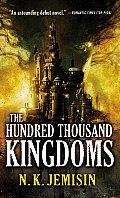
| Series: | Inheritance #1 |
| Publisher: | Orbit |
| Copyright: | February 2010 |
| Printing: | October 2010 |
| ISBN: | 0-316-04392-3 |
| Format: | Mass market |
| Pages: | 419 |
Yeine Darr is from a northern tribe and kingdom, considered barbarians by much of the Hundred Thousand Kingdoms. Her father was also part of that tribe, but her mother was the heir of the Arameri, the tribe (and race) who rule the world from their floating palace named Sky. Her mother was disowned when she married Yeine's father to apparently make a new life for herself in the north, but after she dies under mysterious circumstances, Yeine is summoned by her grandfather. To the utter shock of everyone, he names her as a third possible heir, in competition with her two cousins who have lived their lives in Sky and are completely familiar with its intrigues.
The Hundred Thousand Kingdoms looks at the outset like it's going to be a novel of political intrigue, and possibly also one of cultural exploration given the size and diversity of the world to which the title attests. But while there are a few political intrigues and secrets here, that's not the book it turns into. Instead, shortly after she arrives, Yeine has a run-in with the enslaved gods who are the source of Arameri power, and they're the ones who dominate the book.
The world used to have three gods, who divide roughly into the archetypes of chaos, order, and life (the last focusing on growth, death, and change). (It was unsurprising, although mildly disappointing, that chaos and order are both male and life is female.) However, Bright Itempas, the order god and also the patron of the Arameri, defeated the other two gods after a war supposedly caused by them. Now, one of the three is dead, Bright Itempas rules, and all the other gods, including the many created after the three originals, are enslaved and serve Itempas and the Arameri. (Well-read SF readers may start thinking of John Scalzi's The God Engines here. There are definite similarities.)
Shortly after arriving in Sky, Yeine has her first run-in with an enslaved god, makes an unexpected alliance, and starts out on a much different footing than her hosts expect. Rather than a novel of political intrigue, this is mostly a novel of divine intrigue, which is a puzzle of a different sort. The gods are more limited and less flexible in their natures, and more alien in their desires and intentions. Yeine is being toyed with, as she expects, but the reasons for that toying are more the symbolic and mythic reasons of the divine than the mundane politics she's expecting. She's also being used by multiple different parties in different ways, for different reasons, and most of what she knows about the religious history of her world is wrong, or at least extremely incomplete. Yeine serves as the unreliable narrator of sorts in an unusual first-person style, which is both well-grounded in the story and grew on me as I read the book.
If you like divine intrigue between gods who are mostly, but not entirely, archetypes, this isn't bad stuff. It wasn't what I was expecting, but I liked it. There's a bit of a romance, which varies between weird and bad-boy conventional, and I could have done with a bit less of the slightly repetitive, supposedly scary darkness. But the rest of the gods are more interesting, particularly Sieh, and even the romance has its moments. The theology doesn't go too far afield, but there are some unconvential relationships between the gods and plenty of twists and discoveries for both the reader and Yeine. And while Yeine gets tossed, pushed, and cajoled along for most of the book, she does get a chance to make some significant decisions in the end, and has a refreshing understanding of her own strengths and shortcomings and the degree to which she's in over her head.
Apart from the divine intrigue, though, the setting doesn't fare as well. Sky is the only fully-developed setting, and even it I had a hard time picturing. Despite supposedly having a hundred thousand kingdoms, the world doesn't have the feeling of scope, variety, or vivid color I was expecting from the title; you could tell me there are only five kingdoms, and I couldn't remember anything in the book to contradict you. We do get to see a bit of Yeine's home country and traditions, but even that is awkward and felt strained. It seems to be a warrior society with rather implausible (and basically unexplained) inverted gender roles. It also had distressingly little impact on Yeine's interactions in the rest of the story. If she comes from a society in which women are the superior warrior cast and men are protected homebodies, why does she have the (very conventional) reactions to Nahadoth that she has?
This is one of those books where the protagonist stumbles onto and through most of the plot, impacting the people around her mostly by being a decent, honest person in a place where those are rare, with a side helping of courage, determination, and the realization she has little to lose. I don't want to sell that short; I liked Yeine, was rooting for her, and enjoyed the climax of the book immensely. But I wish there had been more depth. The world doesn't get much development, the politics are fairly conventional, and the theology, while both the best and the deepest part of the book, isn't quite enough to satisfy.
This is worth reading, and I'll probably grab the sequel. Hopefully Jemisin will give the world more depth as the series continues. But it's probably not worth going out of your way to find.
Followed by The Broken Kingdoms.
Reviewed: 2011-07-20